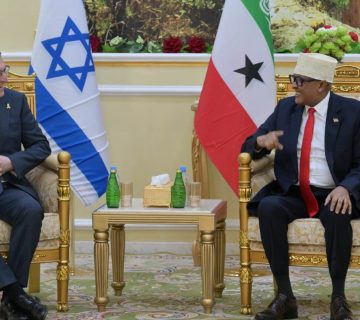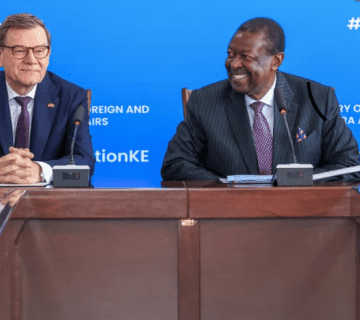Khartoum, Sudan’s capital, and the western city of Darfur, plunged into violence on April 15, 2023. This was a culmination of a power struggle between the Sudan Armed Forces (SAF) headed by General Abel-Fattah al-Burhan, and the Rapid Support Forces (RSF), headed by General Hamdan Dagalo. The two disputing leaders had earlier on worked together in Sudan’s Transitional Sovereignty Council (TSC), with their tenure having been characterized by a delayed transition to democracy. As the transition dragged on and eventually stalled, tensions were increasing over who should be the commander in chief of the armed forces once the two armed forces are integrated. This resulted in the ongoing armed conflict. As of June 8, the conflict had generated over 450,000 refugees, returnees and asylum seekers who have in turn enhanced the strain on the few resources allocated for international humanitarian agencies. Similar to other conflicts, various actors have also seized the opportunity to gain political leverage in Sudan and their regions. In the midst of ongoing global inflation, the war has brought about adverse economic implications to the region. In the wake of failed ceasefires and the suspended US-Saudi Arabia mediation, the Inter-governmental Authority on Development (IGAD) has proposed a roadmap for the mediation of the conflict.
The Ongoing Humanitarian Crises in Horn Africa
Prolonged conflict is likely to worsen the refugee-related humanitarian crisis in the region mainly because Sudan hosts the second-largest number of refugees in Africa. Due to shared porous borders, Ethiopia, Central African Republic (CAR), Djibouti, and South Sudan are the states likely to record an influx in the number of refugees fleeing the conflict. Eritrea may not record as high a number due to the political climate. On the other hand, a dilemma lies ahead for the thousands of refugees and asylum seekers currently being hosted in Sudan. A bleak reality lies ahead for refugees from CAR, South Sudan and Eritrea, the former of whom fled from war-torn states, while the latter fled political persecution. A choice must be made between going back to their states, remaining in Sudan or making the arduous journey to another country.
This refugee crisis is happening concurrently with the ongoing food crisis due to the longest drought in the region in over 40 years. As of June 8, 459,477 refugees, returnees and asylum seekers had fled Sudan to bordering states. This occurs in the midst of a USD 7 billion appeal by humanitarian agencies to the United Nations (UN), so as to mitigate drought effects in the region.
External Influence and Regional Political Implications
The Horn region has increasingly gained geopolitical relevance, and this latest conflict has showcased the interest external powers have in the peace and security of the region. Saudi Arabia earlier utilized its influence to host and mediate talks between the warring sides. Saudi Arabia also made a donation of USD 100 million making it the second largest contributor, after the United States (US), towards abating the humanitarian situation. Through its various naval air bases and ports, it has evacuated thousands of foreign nationalities, with only hundreds of them being Saudi citizens.
Saudi Arabia’s influence in Sudan has however posed a challenge to regional powers such as Kenya and Ethiopia. While Ethiopia is closing the economic gap with Kenya, the latter is interested in exercising its influence by playing a pivotal role in the realization of peace. After several appeals to host the warring sides, Kenya emerged as chair of the IGAD quartet on Sudan. On behalf of the quartet, Kenya committed to meet the two leaders face to face in a bid to find a lasting solution to the crisis. Two days after the declaration, Sudan’s TSC however rejected IGAD’s mediation roadmap, citing that it had not consented to it, despite the release of an official communiqué.
Economic Implications on the Region
While all states within the Horn region are not likely to face major economic implications as a result of the conflict, this is not the case for South Sudan and CAR. Sudan has divided loyalty between the Common Market for Eastern and Southern Africa (COMESA) and the Arab League. Sudan’s economic ties are largely with Arab league states, explaining why the latter has quickly responded to promote peace and safeguard their interests. South Sudan and CAR rely on Port Sudan as a commercial sea gateway due to their landlocked nature. In the past, reliance on Port Sudan has often had adverse economic implications arising from blockades by the Beja community during civil unrest. Likewise, protracted conflict in Sudan might take a heavier toll on South Sudan and CAR’s commercial activities.
South Sudan is also on the receiving end when counting losses with regard to oil revenue. Since its secession, it has relied on Sudan’s refineries and pipelines to transport its oil to the world market. South Sudanese government officials expressed their concerns, that the fighting risks damage to the pipeline that transports crude from the oilfields to Port Sudan in the Red Sea. Damaging of the pipelines places South Sudan at an economic risk since oil revenues account for 70 per cent of the Gross Domestic Product (GDP)
Way Forward
Despite the earlier suspension of the US-Saudi Arabia-led talks and the rejection of IGAD’s mediation roadmap, there is still hope for stability in the region. Sudan’s TSC signalled that it was willing to take part in a mediation led and hosted by South Sudan contrary to the proposed one that is led by Kenya. Since Sudan has also rejected the expansion of the IGAD troika to include Ethiopia, IGAD should consider reverting to the former that consisted of South Sudan, Uganda and Kenya. As the team plans on solving the current crisis, it should consider an inclusive and broader dialogue that includes countries such as the US, Saudi Arabia and the United Kingdom, all of which have a commanding influence in Sudan. The dialogue should also include relevant domestic stakeholders, to discuss the future political dispensation of the country.
Jeremy Oronje is a Research Intern at the HORN Institute
Photo: Refugees arriving in the Ethiopian border town of Metema. More than 30,000 people have crossed the border since Sudan’s civil war began in April (Photo Credit: Sara Creta/TNH)
The contents of this article are copyright of © The HORN Institute 2022. All rights reserved. Any redistribution or reproduction of part or all of the contents in any form and for whatever reason is prohibited. You may use the content of this article for personal reasons, but acknowledge the author and cite the website as sources of the material.



